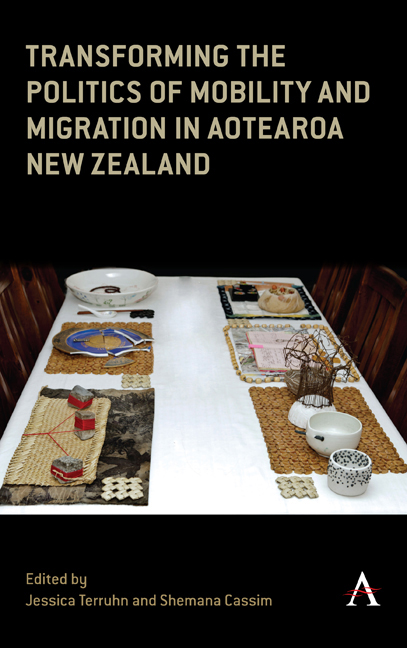Book contents
- Frontmatter
- Contents
- Acknowledgements
- Contributors
- Glossary of Te Reo Māori Words
- Glossary of Te Reo Māori Place Names
- Glossary of Other Non-English Words
- List of Tables
- List of Figures
- Introduction: Reimagining the Politics of Mobility and Migration Through Decolonisation, Social Justice and Solidarities
- Cover Artwork: A Place at the Kauri Table Revisited … 2021
- Part One Decolonising the Politics of Migration
- Part Two Humanising the Politics of Transnational Mobility
- Part Three Building Solidarities for Migrant Rights and Belonging
- Conclusion: Towards Transforming the Politics of Mobility and Migration in Aotearoa New Zealand
- Index
Eight - Building Enduring Relationships for a Shared Sense of Belonging: Culturally Derived Solidarities Between Muslim Migrants and Māori
Published online by Cambridge University Press: 28 February 2024
- Frontmatter
- Contents
- Acknowledgements
- Contributors
- Glossary of Te Reo Māori Words
- Glossary of Te Reo Māori Place Names
- Glossary of Other Non-English Words
- List of Tables
- List of Figures
- Introduction: Reimagining the Politics of Mobility and Migration Through Decolonisation, Social Justice and Solidarities
- Cover Artwork: A Place at the Kauri Table Revisited … 2021
- Part One Decolonising the Politics of Migration
- Part Two Humanising the Politics of Transnational Mobility
- Part Three Building Solidarities for Migrant Rights and Belonging
- Conclusion: Towards Transforming the Politics of Mobility and Migration in Aotearoa New Zealand
- Index
Summary
Introduction
The 2019 Ōtautahi Christchurch (hereafter, Ōtautahi) terror attacks in Aotearoa New Zealand foregrounded an emergent relationship between Māori and Muslim communities (Andrews 2019; Parahi 2019). In the aftermath of the attacks by a lone gunman who entered two mosques in Ōtautahi and shot unarmed worshippers, killing 51 people, there were numerous gestures of support and care shown by Māori communities towards Muslims. These included marae (Māori tribal meeting places, including a traditional meeting house) opening their doors to Muslim mourners, te reo messages of kia kaha (be strong) and aroha (love) written outside mosques and translated into Arabic, and a joint spiritual cleansing by Ngāi Tahu (the principal Māori iwi/tribe in the South Island) and Muslim leaders of the two mosques that were attacked (Homayun 2020). Immediately following the Ōtautahi attacks, initiatives occurring at the government level included various support and relief efforts led by E Tū Whānau, a ‘by Māori for Māori’ movement affiliated with the Ministry of Social Development (see Khan-Janif this collection).
This chapter unpacks the complex culturally derived value systems characterised by respect, reciprocity and relationality that are central to this budding relationship between Muslim migrants and Māori. We demonstrate that relationships built on such values can be a fruitful avenue for cultivating solidarities through a shared sense of belonging between Muslim communities and Māori in Aotearoa New Zealand. The bonds that are forming between Muslim migrant and Māori communities further constitute a starting point that may serve as a pathway for developing enduring relationships between migrant communities of Colour and Māori in this nation. For far too long, mana whenua (local Māori authorities) have been side-lined in conversations relating to migrant settlement, to the detriment of these communities (both migrant and Māori). The pervading settler colonial rhetoric that guides migrant settlement strategy in Aotearoa New Zealand does little to create opportunities for building enduring relationships and solidarities between migrant communities of Colour and Māori as tangata whenua (people of the land). In particular, current mainstream settlement strategies and symbolic aspects of settlement (such as the citizenship oath for instance) offer limited guidance on how migrant communities, including Muslims, might build respectful and mutually beneficial connections with Māori. Throughout this chapter, we argue that a focus on culture-centred relationship building can cultivate a relational sense of belonging for both Muslim migrants and Māori by recentring Māori as the hosts of this whenua (land).
- Type
- Chapter
- Information
- Publisher: Anthem PressPrint publication year: 2023

